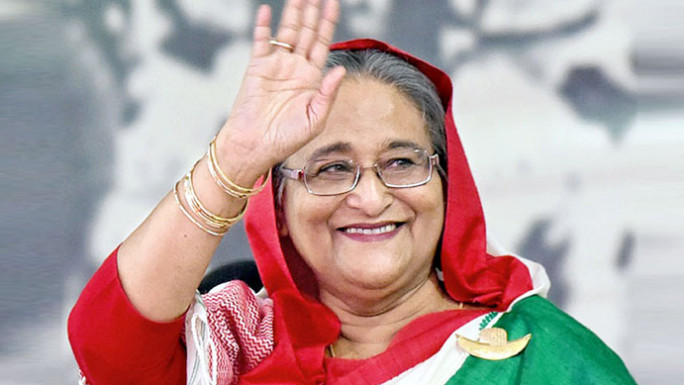Sheikh Hasina has secured her fifth term as Bangladeshi Prime Minister in an election the outcome of which was known even before a single vote was cast. Her victory was a foregone conclusion after the main Opposition, Bangladesh Nationalist Party (BNP) had announced its boycott of the poll. But, what has come as a surprise is the subsequent scandalously low voter turnout that has put a question mark on the legitimacy of the victory.
Another surprise that the poll outcome has sprung is that instead of any political party, independent candidates secured a total of 63 seats, the second highest after Hasina’s Awami League (AL), which won 222, creating a problem of finding a parliamentary Opposition. The current Opposition, the Jatiya Party, managed to secure just 11 of the 300 parliamentary seats, according to the Election Commission. Almost all the winning independent contenders are people who had been rejected by the Awami League but asked by the party leadership to stand as “dummy candidates” to give the election a competitive veneer in front of the world. As such, the outcome of the election is being described by Bangladesh watchers as bizarre.
The election was one-sided, but the low voter turnout and the controversial manner in which the Election Commission (EC) changed its own figures of polling percentage have cast serious doubt on whether it was truly a participatory election. After polling closed at 4 p.m., the EC said the turnout was 40 per cent. A little earlier it had announced the figure of 28 per cent. The Opposition doubted the authenticity of even the lower figure. Reports emanating from Dhaka on the election day – January 7 – revealed polling booths in the capital itself were so empty never seen in recent past. Some analysts pointed to the confusion at the EC announcement. Former Election Commissioner, Sakhawat Hossain summed up the situation by telling the media that it was hard to believe the turnout was 40 per cent, given the fact that the CEC gave the figure of 28 per cent at his first briefing of the media. In fact, the turnout figure shown on the dashboard at the EC headquarters hours after the briefing was 28 per cent and a photo of it was widely circulated in the country’s social media drawing flak from one and all. An hour before the close of polling the EC had declared the percentage of polling was 27. The jump from 27 to 40 in a span of an hour or so was ridiculous indeed and it tarnishes the EC’s reputation. Critics claim the Indian counterpart will now ensure such a goof up does not happen in the forthcoming Parliamentary election due in a few months.
Even if one goes by the Bangladesh EC figure of 40 per cent, it shows 60 per cent of the people stayed away from polling either due to fear of trouble following the BNP’s boycott call or disillusionment with the ruling party.
Predictably enough AL leaders have claimed the election is a “victory of our democracy” and a “befitting reply to BNP’s terrorism through the ballot paper.” While the last two national elections were tainted with dozens of deaths and widespread violence, polling this time around witnessed only one death and very few clashes, making it one of the most peaceful polls in the South Asian nation’s history. This prompted Hisham Kuhail, the CEO of the Central Election Commission of Palestine, one of several foreign observers of the poll, to tell a media briefing afterwards that people of the country should be “proud of holding such a peaceful election.” He, however, avoided questions about voter turnout and said he was assessing only the technicalities of the voting process – whether voters were allowed access and whether voting took place systematically.
The Russian observer Andrei Shutov also said the voting process was systematic and peaceful. “This election is legitimate,” he added. The BNP slammed such “certifications”. Its information and technology affairs secretary AKM Wahiduzzamane said the election was peaceful because “there were no voters”, but it was not legitimate because the people did not “legitimise them through votes.”
It is true that Sheikh Hasina has been instrumental in the turnaround of Bangladesh’s economy. All the same her rule is characterised by ruthless crackdown on Opposition and a section of the critical media and civil society activists. This may explain the low voter turnout. If she wants legitimacy, she needs to improve her government’s human rights records too.
